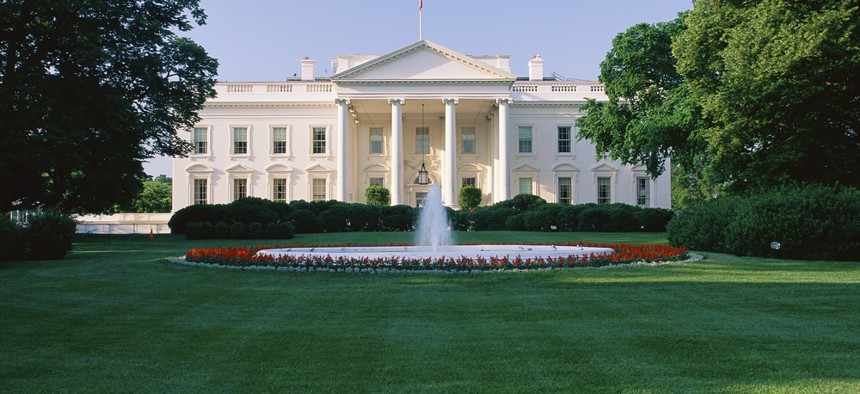
spirit of america/Shutterstock.com
The White House Is Spoiling for a Fight on Immigration
Obama seems determined to push ahead, despite the fears of some Democrats.
The White House appears to be moving full-speed ahead on an executive order that would provide widespread protection to illegal immigrants from deportation, Republicans—and maybe some Democrats—be damned.
Those close to the process expect an order in the first few weeks of September—and expect it, in the words of one immigration advocate, to be "significant."
White House aides stress that nothing has been finalized. Yet the administration's posture has been one of anticipating—even inviting—a highly public confrontation with Republicans over the issue. And while the concerns of vulnerable Senate Democrats in key races are being taken into account, they don't seem to be persuading the White House to deviate from its course—suggesting that the matter is viewed less in terms of the politics of the moment and more in terms of President Obama's long-term liberal legacy.
"Have no doubt, in the absence of congressional action, I'm going to do what I can to make sure the system works better," Obama told reporters at the White House on Thursday.
Even as the ultimate scope of the order remains unclear, Obama is in a position where he almost has to go big, because no matter what he does, it will be construed that way by the GOP. Already, this week, Republican Sen. Marco Rubio of Florida, among others, has suggested that the order could fuel a showdown over funding the government at the end of the month. Another lawsuit, too, is nearly inevitable.
Obama's aides have been anticipating this response almost since the end of June, when the president first pledged to act on the issue in the face of a paralyzed Congress. At a breakfast with reporters last month, Dan Pfeiffer, a top adviser, seemed to relish the idea of a GOP freak-out, saying he was certain the president's order would provoke an "aggressive" response. And this week White House press secretary Josh Earnest has been dismissive of Republican threats.
All of it is rooted in the belief that painting Republicans as extremists willing to shut down the government (or impeach the president) over the issue helps both Obama and midterm Democratic candidates. But that view isn't universal.
"There is growing concern about the issue creeping into '14 in a bad way," says one Democratic strategist. "No question where the long-term advantage lies, but right now, in an ugly year, it's raising an uglier head."
Nervous Senate Democrats such as Kay Hagan of North Carolina, Mark Pryor of Arkansas, and Jeanne Shaheen of New Hampshire in recent days have urged Obama to go slow. "Sen. Shaheen believes Congress must address our broken immigration system with a comprehensive fix and would not support a piecemeal approach issued by executive order," says Shaheen spokesman Shripal Shah.
New Hampshire has been one state where the immigration issue—brought to a head by the border crisis earlier this summer—is being credited for narrowing the gap between Shaheen and her likely challenger in the fall, former Sen. Scott Brown. A recent poll showed Shaheen's lead over Brown, once in double digits, to be crumbling. Brown, more than most candidates, has been hitting the executive-authority issue hard. "Immigration has been a top-tier issue in New Hampshire for years," says Jeb Bradley, a former GOP congressman in the state.
Shaheen's particular problem is that she supported both the comprehensive reform bill passed last year that died in the House and backed Obama's unilateral move in 2012 to provide deportation relief to so-called "dreamers"—children brought across the border by undocumented parents. Any criticism now can be framed as backtracking. Other at-risk Democrats such as Hagan and Pryor also supported the reform measure.
Moreover, once it became clear that the House wasn't going to act on the Senate bill, high-profile Senate leaders such as Chuck Schumer of New York called for Obama to act on his own. Schumer's office said that he hasn't shifted from that stance and has not asked the White House to delay the order until after the midterms.
Indeed, there's a school of thought that if Obama waits until after the midterms to act, he may be doing so in advance of a Republican Senate that will dedicate itself to rolling back the order. Doing it now at least affords the possibility that the ensuing controversy will galvanize base voters and ward off a handover of the chamber to the GOP.
Unfortunately for Democratic incumbents, however, the map affords them very little opportunity to use the issue to drive Hispanic turnout. The only state where it could conceivably make a positive difference is in Colorado, where Sen. Mark Udall is matched up in a tight race with Rep. Cory Gardner.
Otherwise, it's more than possible in states such as Arkansas, Michigan, New Hampshire, and North Carolina that Obama's order will feed the Republican narrative of an out-of-control chief executive, perhaps serving as the wedge issue that puts the GOP candidates there over the top. The National Republican Senatorial Committee points to polls that show that a majority of independents who favor legislative reform oppose unilateral action.
Compounding the issue from a messaging standpoint is that Obama spent much of the first part of the year talking about how he lacked the power to make bold moves to reshape the nation's immigration system. Those words will certainly be used against Obama and Democratic candidates in GOP campaigns.
But the White House appears to not be overly concerned about any of this—and that's in line with its approach to the midterms to date. While the president has been a voracious fundraiser for the party, he hasn't held back from pursuing what might be called legacy issues—even if those actions might harm moderate Democrats. (A similar view helped cost Democrats the House in 2010.)
Immigration is one example. Another is climate change. The administration's proposed limits on coal-fired power plants were released this summer, much to the consternation of Sen. Mary Landrieu, fighting for her survival in energy-producing Louisiana. And the administration is pursuing a global climate agreement that could be executed without congressional approval, another action likely to feed that building GOP narrative. Nor has the administration shown any inclination to approve the Keystone XL pipeline, which would at least give someone like Landrieu a positive talking point.
The long-term political view is that granting widespread deportation relief will accrue to the Democrats' advantage in 2016, helping to ensure that the Obama Coalition doesn't fray, the president is succeeded by a Democrat who will safeguard his signature accomplishments, and the Senate, if lost, is regained. "This will be a generational-defining move," says Frank Sharry, president of America's Voice, which has been lobbying for a dramatic executive order.
If some eggs are broken along the way, so be it.
Alex Roarty contributed to this article.
(Image via spirit of america/Shutterstock.com)







